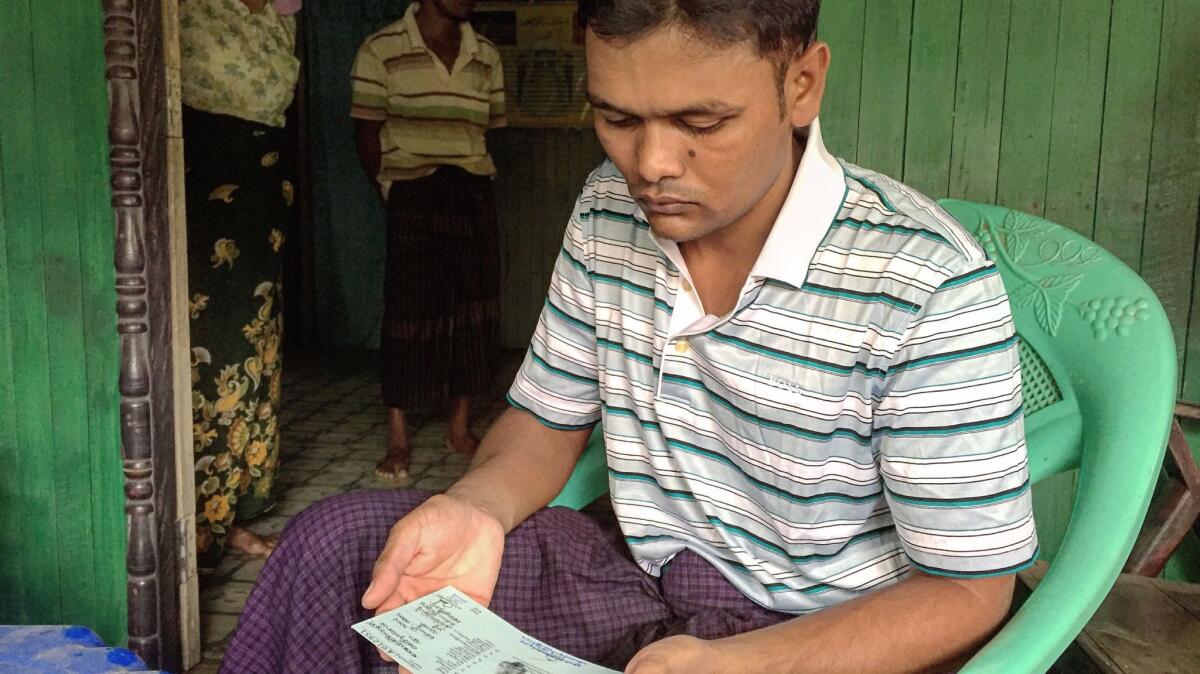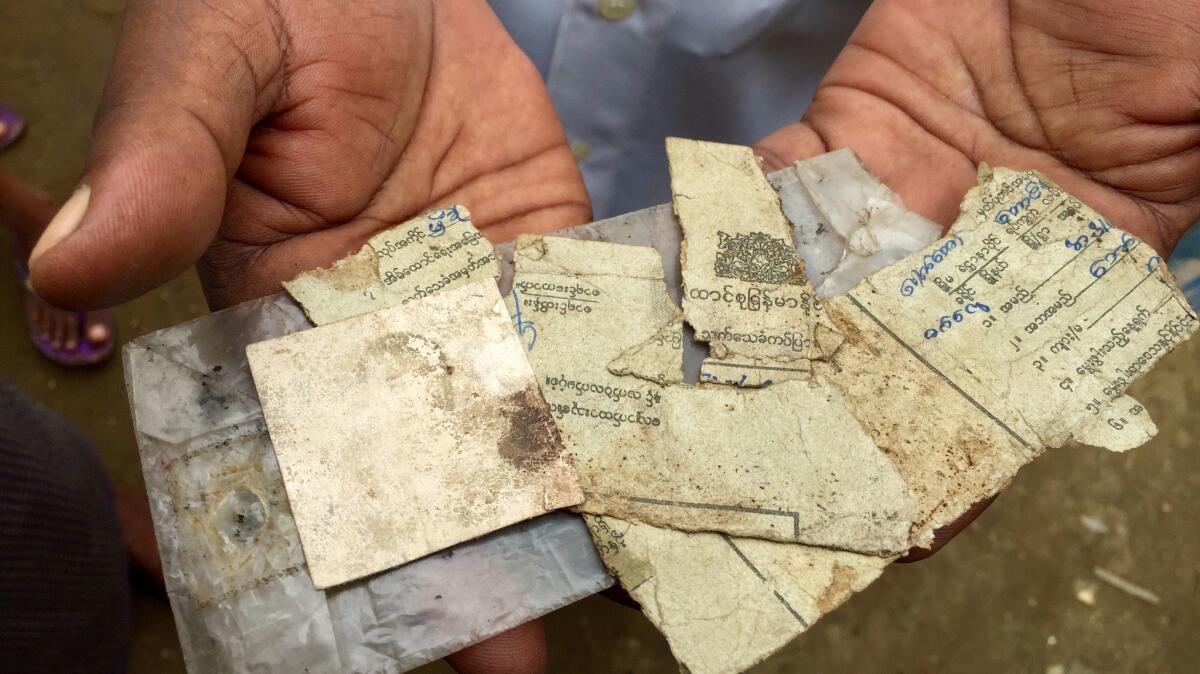Myanmar’s long-suffering Rohingya Muslims hoped that Aung San Suu Kyi would make them full citizens. They were wrong

- Share via
Reporting from Sittwe, Myanmar — It is just an ID card, sky blue and gently creased, but it is Mohammad Siddique’s greatest source of shame.
The indignity arises not from its routine details — his name, date of birth, photo, thumbprint — but from what it omits. Unlike documents held by citizens of Myanmar, there is no mention of Siddique’s race or religion.
To him it is an identity card that erases his identity.
Siddique, 25, is a Rohingya Muslim, a stateless minority of more than 1 million people who live in apartheid-like conditions in the overwhelmingly Buddhist nation of 53 million previously known as Burma.
Stripped of their citizenship by the country’s former military rulers, many are effectively trapped in villages and internment camps without the right to travel, work or marry freely within the country where they were born.
After a half-century of military rule, human rights activists and Myanmar’s international allies hoped that Nobel Peace Prize winner Aung San Suu Kyi would loosen the restrictions when her civilian government took office a year ago. But she has refused to restore citizenship to the Rohingya or recognize them as an ethnic group — a sign of the army’s enduring influence as well as the deep antipathy that many Myanmar Buddhists, including leaders of Suu Kyi’s own party, feel toward Muslims.
In a limited step, Suu Kyi has adopted a plan to issue the Rohingya ID cards that acknowledge they are residents and start a process to consider their citizenship claims, with no assurances.
They just want to kick us out of this country.
— Mohammad Siddique, a Rohingya Muslim in Myanmar
But many Rohingya oppose the cards, saying the omission of ethnicity is part of a continuing effort to eradicate any record of their existence here.
“This government doesn’t want to accept us as citizens of Myanmar,” Siddique said at his home in U Yin Thar, a Rohingya village of tidy wooden shacks outside the coastal town of Sittwe. As a downpour lashed the tin roofs, children scurried barefoot through muddy lanes and Siddique’s voice grew faint.
“They just want to kick us out of this country,” he said.
The ID push comes as the United Nations’ Human Rights Council prepares to investigate reports that the Myanmar army indiscriminately killed, raped and abused Rohingya civilians during a crackdown that began last October in northern Rakhine state, 60 miles from Sittwe.
“Trust has been eroded for decades” between the Rohingya and the government, said Matthew Smith, co-founder of Fortify Rights, an advocacy group in Southeast Asia. “It’s lunacy to think that soldiers could commit atrocity crimes with impunity on Monday and have civilians happily cooperate with the [ID] scheme on Tuesday.”
“There is no meaningful difference between the previous and current regimes on this issue,” he said.
Myanmar has long viewed the Rohingya — who share physical, cultural and linguistic similarities with South Asian ethnic groups — as foreigners from neighboring Bangladesh, even though many families have lived here for generations.
In 1982, the army enacted a law that dialed back full citizenship to include only members of 135 “national races” that purportedly existed in Burma before British colonialists invaded in 1824. The Rohingya were not included.
Under the law, the best they could hope for was naturalization and a limited set of rights granted through a verification process that has proved slow and opaque.
“You’d be hard-pressed to find anywhere on the planet that privileges particular ethnicities the way Myanmar does,” said Ronan Lee, a researcher at Australia’s Deakin University who has studied the Rohingya.
In 2014, when the former government introduced the ID cards, it ordered the Rohingya to identify themselves as “Bengali,” a label they oppose. Last year, Suu Kyi relaunched the effort, but tried to skirt the issue of ethnicity by eliminating race and religion from the document.
By early February, officials said they had issued 6,202 cards in western Myanmar’s Rakhine state, home to most of the Rohingya population. Rohingya leaders say many of those were the result of coercion.

Siddique said he was tricked into accepting the card as a condition of his release last month from jail.
He had served 17 months for violating travel restrictions that have been strictly enforced since clashes erupted between Buddhists and Muslims in 2012 and the government confined more than 120,000 Rohingya to swampy displacement camps at the edge of Sittwe.
Unable to work or study freely, thousands have attempted to escape on overcrowded fishing boats bound for Thailand and Malaysia.
In October 2015, Siddique took his chances by slipping into the back of a car headed south toward the city of Yangon, but was quickly intercepted by police and arrested.
The day before he was freed, he was brought to a room where a prison guard took his picture and told him to sign and leave a thumbprint on one side of what Siddique thought was a prisoner release form.
When he folded the card over, his heart fell. “Identity Card for National Verification” was printed in bold letters.
At home, he reluctantly showed his family the document, holding it by the edges, as if it were soiled. Although officials said the card would give him freedom of movement, police at the checkpoint that seals off his village wouldn’t let him leave.
“Why did you take it?” his mother asked.
He told her he had no choice, that guards had kicked him with their boots and called him kalar, a slur for dark-skinned.
“I worry that the card will be used to persecute him,” said his aunt, Zurah Khatu.
Siddique was born in the same village as his father, who once worked for the army. No one in the family has held a job since 2015, when authorities bowed to the demands of Buddhist nationalists and revoked the temporary IDs that had allowed the Rohingya one of their last basic rights: to vote.
Unlike other controversial provisions enacted under military rule — such as blocking Suu Kyi from the presidency because she had a foreign spouse, or reserving one-quarter of parliamentary seats for the military — there is little support in Myanmar for changing the citizenship law. With Buddhist nationalists and extremist monks fanning anti-Muslim sentiment, Suu Kyi has remained largely silent on the Rohingya question.
U Nyan Win, a spokesman for Suu Kyi’s party, said the government supported expanding citizenship criteria — to a point.
“We want to see citizens, not ethnic groups,” he said. “But there is no such ethnic group as the Rohingya in our history.”
Even Suu Kyi’s modest step has triggered protests in Rakhine state among hard-line Buddhists who complain that making Rohingya eligible for citizenship risks “Islamizing” the country — even though it’s more than 90% Buddhist.
“The government should be conscious of the security of the country,” said U Aung Htay, leader of a Buddhist civil society group in Sittwe. He pointed to the deaths of nine police officers in northern Rakhine last October at the hands of alleged Rohingya militants, a series of attacks that prompted the army crackdown.
“If that kind of attack happens again, people will suffer,” he said. “And you can assume the Bengali people are responsible.”
Rohingya say that even if they accepted the new ID, many would have little chance of meeting the law’s onerous requirements for regaining citizenship, including “conclusive evidence” of lineage in Myanmar.
In the Maw Thi Nya displacement camp outside Sittwe, 63-year-old Abdul Shafi held out his battered old citizenship card — nullified by the 1982 law — that he rescued from the 2012 clashes.
Shafi said officials had visited the camp multiple times in recent months to promote the new card, and he worried the government would use their refusal as a pretext to expel Rohingya from the country. As a group of men around him nodded vigorously, he remained defiant.
“We will not take this card,” he said. “Even if they kill us, we will not accept it.”
Follow @SBengali on Twitter for more news from South Asia.
MORE WORLD NEWS
India banned a movie about four women because it was ‘lady-oriented.’ It plays in L.A. this week
An extremist Hindu leader rises in India, along with hopes for a controversial temple
More to Read
Sign up for Essential California
The most important California stories and recommendations in your inbox every morning.
You may occasionally receive promotional content from the Los Angeles Times.











